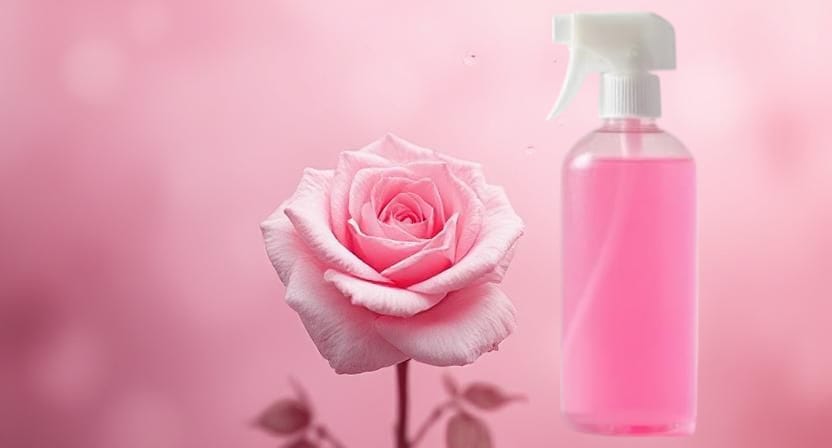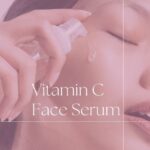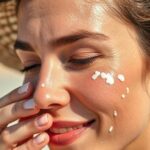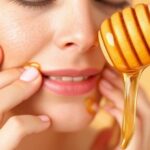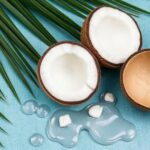Just scroll through any beauty guru’s posts on Instagram, and it seems that a skincare routine is not complete without a rose water spray. Cooling, hydration, glowing skin? All promised. But the real question is rosewater spray really work, or is it just a pricey folly?
Rose water spray: Traditional fragrance or modern science?
This fragrant water from rose petals has been part of our grandmothers’ beauty regimen for centuries, but do modern research findings support this? Let’s break down the facts:
What does science say?
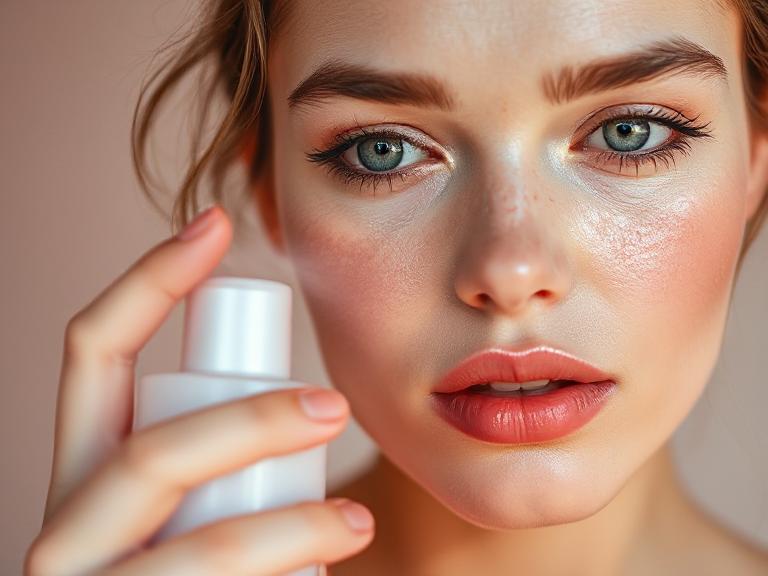
Anti-inflammatory properties: A 2017 study (Journal of Food and Drug Analysis) supports that rose water has benefits for skin because it contains a number of compounds like phenyl ethanol that have been reported to have anti-inflammatory properties. Which means it can help alleviate redness, irritation, and sunburn.
Antioxidant Action: It might be beneficial for slowing the skin’s aging (wrinkles, fine lines), if it fights free radicals.
pH balancing: The pH of rose water is pretty similar to that of the skin’s natural pH (around 5.5), and it can help maintain your skin’s natural protective barrier (mantle), especially after cleansing.
Mild astringent: It can help to constrict pores a bit, which might help if you have oily skin.
Ayurvedically:
In Ayurveda, rose water (taruni ark) is thought to be cool, satiating, and calming to the mind. It pacifies pitta, the dosha known for heat, inflammation, and sensitized skin. Ayurvedic Practitioner Dr. says, “Rose water is not simply a fragrance, but a natural treatment to cool and nourish the skin from within; this is particularly beneficial during the summer months.”
Real benefits of rose water spray: What can you expect (and not)?
So yes, it works! But…know its limitations, it is not a magic wand.
What it can do (Real Benefits):
Instant cooling and refreshing of the skin: After heat, stress, or fatigue, a spray on the face brings about a refreshing feeling with flavour intensity! This is the biggest and immediate benefit!
Light moisturisation (hydration): It does not seal in moisture in the skin (like a moisturiser does), rather it pulls it from the environment and hydrates skin immediately. It is a great boost for dry skin, but it is not enough on its own.
pH balancing after washing: Soap or face wash may disrupt the pH of the skin. Rose water spray quickly helps the pH return to baseline.
Reducing inflammation and redness: It helps to calm light inflammation and redness after sensitive skin or sunburn/removal.
Makeup setting/refreshing: A fine spray over top of makeup can help to set makeup and keep that fresh look all day.
Mental wellness: The scent of rose will be an aromatherapy for your heart, mind, and spirit to refresh you and reduce stress.
Limitations:
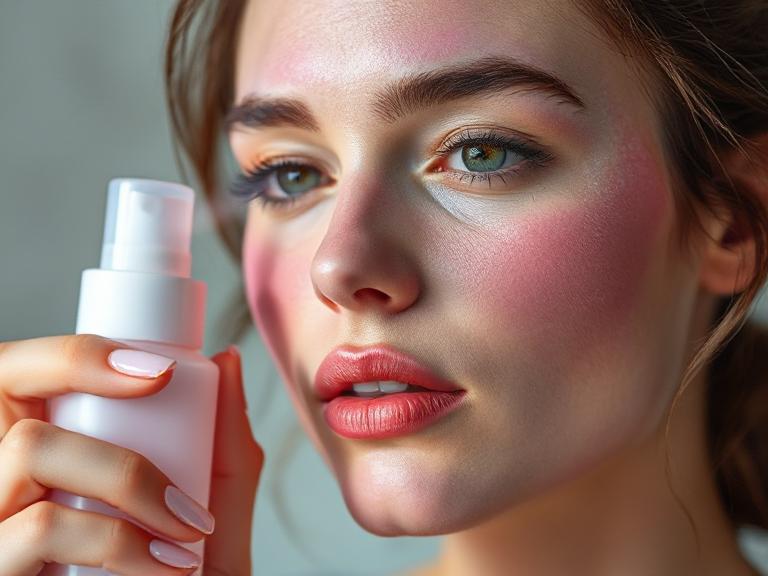
Deep moisturisation: You can dry out your skin if you skip your moisturiser. It is not a replacement for a moisturiser.
Treatment of deep skin conditions: It does not treat acne, eczema, or rosacea. It will only help to lighten symptoms.
Miraculous glow or clear skin: Using it alone will not magically brighten your skin. A good diet, sunscreen, and proper skincare are a must.
Removal of wrinkles: Its antioxidant qualities are great, but it cannot compete with the actives like retinol or vitamin C.
Who benefits? Who takes caution? (Depending on skin type)
Great for sensitive skin: Very mild and can be used in most instances. Even great to help reduce inflammation.
For dry skin: a good hydrating booster, but use it with a moisturiser.
For oily skin: A Mild astringent effect can be nice and tones the pores without over-drying the skin.
For mixed skin: Good for both zones.
Caution: If you have an allergy to rose or perfume, do a patch test. Some brands use preservatives or add ‘fragrance’ that can irritate sensitive skin. Always go for pure, unadulterated rose water (Pure Rose water/Hydrosol).
Make Pure Rose Water Spray at Home! (Simple DIY)
Don’t trust the products on the market? Make real, unadulterated rose water spray at home.
Ingredients:
Fresh rose petals (organic and pesticide-free) – 2 cups
Pure water (filtered or distilled) – 2 cups
Clear glass jar (with lid)
Strainer or muslin cloth
Spray bottle (dark is better)
Procedure:
Wash off any dirt from the petals gently.
Add the petals to the jar, along with the water. Put on the lid.
Fill a pot with water, and place the jar in the pot (double boiler method). Boil on medium flame for 20-30 minutes. The petals should turn pale.
Turn off the gas. Let it cool.
After cooling, strain through a sieve or muslin cloth, and discard the petals.
Add the liquid into the spray bottle.
Keep in the fridge. It will stay fresh for 1-2 weeks.
Expert hint: Dr Amit Jain, cosmetic chemist, says, “Home rose water ensures you are using pure rose water, but you have a short shelf life. Choose a good market brand that has preservatives, it will keep it safe for a long time.”
Ritu’s story: a companion to nip sunburn.
Ritu, who visited my clinic after a trip to Goa was ruined by sunburn, came in with a red, burning, annoyed face. I told her to spray a refrigerated pure rose water spray every 2-3 hours until the redness reduced. I applied a refrigerated pure rose water spray and occasionally added aloe vera gel. Within 24 hours, the burning moved to mildly irritated, followed by significant redness. The cooling effects of Rosewater and the anti-inflammatory properties helped Ritu manage with her sunburn. Here is a before-and-after photo of her! [insert imaginary photo here].
How do you decide which rose water spray is the best? (Buying guide)
There are so many products available! How do you know which is the real rose water?
Ingredients! It should say “Rosa Damascena Flower Water” or “rose hydrosol”. If it says “Fragrance/Parfum”, “Alcohol”, “Parabens”, “Artificial Color” in the product, DO NOT BUY the product. These will damage your skin.
Color and Aroma: True rose water is CLEAR or LIGHT PINK in color. Dark pink indicates the use of artificial color. Finally, true rose water aroma is natural, light floral and not strong or synthetic.
Packaging: Dark colored hot glass bottles are the best to protect from light damage. If they are packaged in plastic, that is not good.
Brand reputation: Look for a well-known and trusted brand; ideally, an organic or ayurvedic brand (Kama Ayurveda, Forest Essentials, Just Herbs, Inatur).
Price: Most importantly, be aware that very cheap rose water is likely to be adulterated. Don’t compromise on quality!
How do I use a rosewater spray correctly? (step-by-step guide)
Just spraying isn’t going to cut it! A few tips to ensure maximum benefits:
Clean skin: Clean and dry face (cleanser or face wash) before spraying.
Distance: Maintain about 8-10 inches of distance from your face. If the spray is too close, it may irritate your skin.
Spray: Give lighter sprays over the face and neck, avoiding your eyes and mouth.
Tap or let dry? You can either choose to:
Tap lightly: Lightly tap with your fingers to help the product absorb and be evenly distributed.
Let dry: Simple spray and air dry. It’s very cool during the summer months!
What’s next? Once the rosewater has dried, you can apply your serum and moisturizer immediately afterwards. Rosewater helps with absorption!
How many times a day? As often as your skin needs a refresh! After cleansing in the morning, after lunch, as a makeup setting spray, during your nightly skincare routine, and even before going to bed.
FAQs
Q1: Is rose water spray safe for all skin types?
A: Absolutely, it’s generally very safe and beneficial for the majority of skin types (dry, oily, combination, sensitive). Just be sure to find a product that is pure and does not include any additional chemicals. Do not use if you are allergic to roses.
Q2: Is rose water spray helpful for acne?
A: It is not going to directly get rid of your acne, however, because of it’s anti-inflammatory properties it can help to reduce the swelling and redness of the acne. It can offer a balancing effect for the skin and helps to keep the pores clean, which indirectly could help prevent acne.
Q3: Is it required to keep rose water spray in the fridge?
A: Not required, however, it can be very beneficial! The cold spray can provide cooling and soothing comfort for the skin during summer months, and especially in cases of sunburn or irritated skin. It also extends the shelf life.
Q4: Can rosewater spray replace moisturizer?
A: Absolutely not! Rosewater spray is a toner or hydration booster. It does not seal the moisture of the skin. It is still very necessary to apply a moisturizer (cream, lotion, gel), especially for dry skin, always after you spray.
Q5: Can I use rosewater spray multiple times a day?
A: Yes, of course! Very mild indeed. You can spray rosewater on as many times a day as you want (even 4-5), whenever your skin is in need of a refresh or light hydration. Zero side effects.
Q6: Does this reduce dark circles under the eyes?
A: There is no evidence to suggest this. However, it’s anti-inflammatory and soothing properties may help reduce the visible-ness of dark circles by reducing mild swelling under the eyes. However, better eye creams are more effective for dark circles under eyes.
Q7: Which kind of rose is best for making homemade spray?
A: Rosa Damascena is the best kind. The petals are super fragrant and the oil is highly perfumed making a quality rosewater.
Conclusion: So, does it work or not? One last point…
Yes, rose water spray absolutely works! But… we need to remember its function and limits of use. It’s not a cure all for acne, but a helpful support system. Rose water spray gives the skin instant coolness, refreshing, a little hydration, and relief from inflammation. Using it in your skincare routine is very effective and can make your routine feel luxurious.
